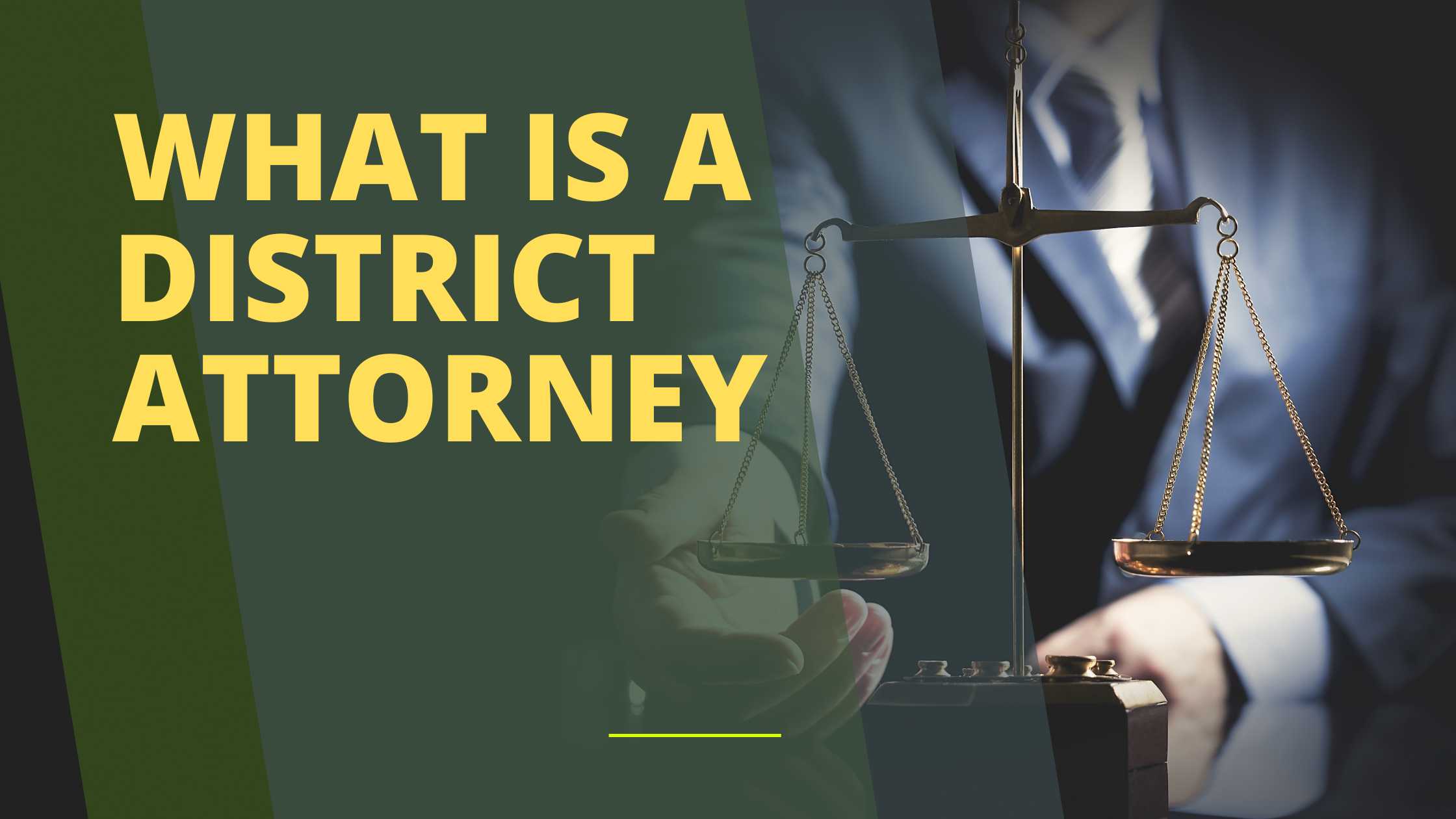What is a District Attorney

A District Attorney (DA) is a public official who prosecutes criminal cases in a specific district. The DA represents the state or government in court proceedings against accused individuals.
The role of a District Attorney is pivotal in the justice system. Charged with the responsibility of legal action for both minor and major offenses, DAs ensure that justice serves the community by holding offenders accountable. They review police reports, decide on filing charges, and strategize the prosecution of cases.
Their tasks also include guiding police investigations, negotiating plea bargains, and advocating for the public’s safety at trials. An effective DA has a profound impact on how law and order shape within their jurisdiction, balancing the scales of justice between the rights of the accused and the expectations of society. This makes them integral to upholding the rule of law and maintaining public trust in legal institutions.

Credit: en.wikipedia.org
The Role Of A District Attorney
The role of a District Attorney is both complex and critical in the justice system.
District Attorneys lead the charge in prosecuting crimes within their jurisdiction. They make vital legal calls each day.
Legal Scope
District Attorneys play a pivotal role in the pursuit of justice.
- Filing criminal charges
- Overseeing grand jury proceedings
- Making plea bargain decisions
Their decisions impact individuals and communities alike.
Public Responsibility
Accountability to the public is at the core of their mission.
District Attorneys seek fair and just outcomes for the society they serve.
They must balance the scales of justice with community safety and welfare.
Equipped with legal expertise, they guide investigations and advise law enforcement.
| Aspect | Role of DA |
|---|---|
| Legal Proceedings | Direct and manage |
| Community Safety | Uphold through prosecution |
| Resource Management | Allocate effectively for cases |
Through justice and integrity, they serve the law and the people.
Becoming A District Attorney
Embarking on the journey to become a District Attorney is both noble and demanding. This prestigious role serves as a cornerstone of the legal system. Individuals passionate about justice may find this career path rewarding.
Education And Credentials
To pursue a career as a District Attorney, rigorous academic preparation is essential. The initial step is obtaining an undergraduate degree. Next, aspiring DAs must tackle law school, earning a Juris Doctor (JD). Various institutions offer these programs.
Law school admission often requires taking the Law School Admission Test (LSAT). Performance on the LSAT is a critical factor in school selection. After graduation, a state bar examination is mandatory. This exam provides licensure to practice law within a specific jurisdiction.
Educational requirements might differ by state. It is wise to research local regulations. Occasionally, additional certifications can enhance a candidate’s qualifications.
Career Path
The career path to becoming a District Attorney is layered with experience and dedicated service. Initially, a role as a prosecutor at a local or state level is common. This position involves trial work, legal research, and case management.
- Gain experience as an Assistant District Attorney (ADA).
- Build a reputation in the community and legal field.
- Network with legal professionals and peers.
Prospective DAs often serve many years in these preparatory roles. Some may also specialize in a specific legal area like homicides or drug offenses. With time and dedication, ADAs can advance through the ranks.
| Years of Experience | Typical Position | Role Description |
|---|---|---|
| 1-5 years | Assistant District Attorney | Handle entry-level prosecution cases, legal research |
| 5-10 years | Senior ADA | Lead serious cases, mentor junior ADAs |
| 10+ years | District Attorney | Oversee the prosecutor’s office, make high-level decisions |
Active engagement in legal organizations and continuous legal education are vital. Oftentimes, the final step to becoming a DA involves a public election or an appointment depending on the locale.
District Attorney Vs. Other Legal Professionals
A District Attorney, often called a DA, plays a vital role in the justice system. Unlike other lawyers, the DA has unique duties. They are prosecutors working for the government. Understanding how they differ from private attorneys and public defenders is crucial.
Contrasts With Private Attorneys
District Attorneys stand apart from private attorneys. Let’s delve into a few key differences:
- Representation: DAs represent the state, not individual clients.
- Focus: Their job is to enforce laws by prosecuting offenders.
- Cost: They are salary-based, not paid by clients.
Private attorneys, on the other hand, offer legal services to individuals or businesses. Clients pay them for their time and expertise. Here’s a concise contrast:
| District Attorney | Private Attorney |
|---|---|
| Works for the public | Works for private clients |
| Prosecutes cases | Defends or advises clients |
| Paid by the state | Paid by clients |
Comparison With Public Defenders
Public defenders and District Attorneys both serve the public, but in different ways. Their roles are often misunderstood. Here’s a simple comparison:
- Role: Public defenders defend those who cannot afford private attorneys, while DAs prosecute.
- Employment: Both are state-employed, unlike private attorneys.
- Objective: Public defenders aim to provide a fair defense, DAs seek justice.
In essence, DAs and public defenders are two sides of the same coin. They ensure the legal process is balanced.

Credit: www.nytimes.com
Challenges Faced By District Attorneys
District Attorneys (DAs) play a crucial role in the criminal justice system.
They make key decisions in prosecuting crimes. But, their job is not easy. DAs face many challenges.
Case Overload
One of the major challenges for DAs is the sheer number of cases. Many offices face a backlog. This can lead to delayed trials and justice.
Key impacts of Case Overload:
- Longer work hours for the DA and their team.
- Increased risk of burnout among staff.
- Potential for oversights due to rush.
Political Pressure
DAs often find themselves in the middle of political battles. They must navigate these pressures while maintaining justice.
Effects of Political Pressure:
| Pressure Source | Outcome |
|---|---|
| Media attention | Can sway public opinion |
| Political figures | May influence case priorities |
Ethical Dilemmas
DAs often face tough decisions. They have to balance the law with moral judgments. Ethical dilemmas are common in their line of work.
Common Ethical Dilemmas include:
- Deciding whether to prosecute a case with weak evidence.
- Managing conflicts of interest.
- A void for potential injustice.
High-profile Cases And The Media
The role a District Attorney plays often extends into the courtroom and onto the front page of news outlets, especially in high-profile cases. When a case captures public attention, the District Attorney’s actions come under intense scrutiny. This interplay between the law, media coverage, and public perception is crucial in shaping the narrative of justice.
Media Relations
District Attorneys must communicate effectively with the media.
- They often hold press conferences.
- They release public statements about ongoing cases.
- Their goal is to inform without compromising case integrity.
Because of this, strong media relations are vital. They ensure the public receives accurate information directly from the source.
Impact Of Public Perception
Public perception can greatly influence the outcome of a case. A District Attorney’s reputation and the trust of the community can tilt the scales in or out of their favor.
Factors that influence public perception include:
| Factor | Impact |
|---|---|
| Media Coverage | Shapes how the public views the case. |
| Community Outreach | Builds rapport between the DA’s office and the public. |
| Transparency | Increases trust in legal proceedings. |
District Attorneys must balance the scales of justice and public opinion to maintain a fair legal process.

Credit: ignitenational.org
The Future Of District Attorney Roles
The role of a District Attorney is pivotal within the legal system, serving as the chief prosecutor for a given jurisdiction. As society evolves, so too must the duties and methodologies of these legal professionals. The future of District Attorney roles stands on the cusp of significant transformation driven by technological innovation, policy reforms, and a heightened focus on community engagement.
Technological Advancements
Technology reshapes the landscape of legal procedures. District Attorneys will increasingly rely on:
- AI algorithms to analyze case data efficiently.
- Digital forensics tools to solve sophisticated crimes.
- Electronic filing systems, streamlining case management.
Additionally, virtual reality might serve in crime scene reconstruction, providing juries with immersive experiences for better understanding.
Policy Changes
Forward-looking policy reforms will shape DAs’ approaches to justice. These transformations include:
- Alternative sentencing programs that focus on rehabilitation.
- Decriminalization of certain offenses to ease burden on the legal system.
- Transparency practices, vital in building trust in legal processes.
Policy shifts demand adaptability and foresight from today’s District Attorneys.
Community Relations
Effective District Attorneys will foster strong ties with the communities they serve by:
| Strategy | Description |
|---|---|
| Outreach Programs | Engaging public through educational initiatives. |
| Listening Sessions | Understanding community needs and concerns. |
| Collaborative Partnerships | Working alongside local organizations for communal well-being. |
Community trust and partnership stand central to the modern District Attorney’s mission.
Conclusion
Understanding the role of a District Attorney is essential for grasping the dynamics of our legal system. They serve as key prosecutors, upholding the law and working for the public’s safety. Remember, their decisions can profoundly impact communities and individuals.
Their pursuit of justice shapes our societal fabric, continuously driving us towards a just world.
Amelia Justiceberg, a distinguished legal luminary, thrives on the intersection of empathy and legal acumen. As a prominent family law attorney, she orchestrates compassionate resolutions amidst complex dynamics. Justiceberg's courtroom finesse and dedication to fairness define her practice. Beyond litigation, she ardently advocates for social justice, solidifying her reputation as an influential force in the legal landscape.






